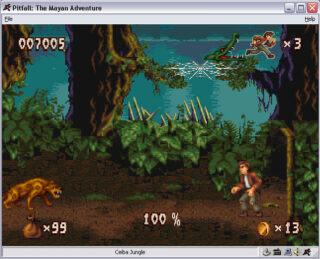Activision stands as one of the most important companies in video game history, pioneering the concept of third-party game development and establishing many of the business practices that define the modern gaming industry. Founded on October 1, 1979, by four ex-Atari programmers—David Crane, Larry Kaplan, Alan Miller, and Bob Whitehead—along with entertainment executive Jim Levy, the company emerged from frustration with Atari's treatment of developers and their refusal to credit programmers for their work.
Activision became the world's first third-party software developer, revolutionizing the industry by proving that independent developers could create games for existing hardware platforms. David Crane emerged as Activision's star developer, creating several of the company's most iconic early titles. His masterpiece Pitfall! (1982) became one of the Atari 2600's best-selling games, featuring innovative gameplay mechanics and smooth character animation that pushed the console's technical limits. Crane followed this success with The Activision Decathlon (1983), developed with the impetus that the Olympics would be returning to the United States in 1984, showcasing his ability to create engaging sports simulations.
Perhaps Crane's most technically impressive achievement was Ghostbusters (1984) for the Commodore 64. Despite its rushed development, Ghostbusters turned out to be a very playable and surprisingly sophisticated game, featuring an RPG-like in-game economy and a thread of story that linked all ghost-busting missions together. The game's success demonstrated Activision's ability to capitalize on popular culture while maintaining high production values.
Crane also created the groundbreaking Little Computer People (1985), an early artificial life simulation that anticipated virtual pet games by decades. This innovative title featured a tiny person living inside the computer who would interact with players in real-time, representing one of the first attempts at creating believable AI companions in gaming.
As a publisher throughout the 1990s, Activision distributed numerous acclaimed titles from external developers. The company published the MechWarrior series, bringing BattleTech's mech combat simulation to home computers with unprecedented depth and realism. Activision also published Quake II (1997), id Software's acclaimed first-person shooter sequel, demonstrating their commitment to cutting-edge action games. Additionally, they handled the computer versions of Wonder Boy in Monster Land, bringing Sega's beloved arcade platformer to home computer audiences.
Other notable published titles included strategic simulations, innovative puzzle games, and early multimedia experiments that helped establish PC gaming as a viable entertainment medium. Activision's publishing strategy focused on identifying promising developers and providing them with the resources and marketing support needed to reach broader audiences.
Activision's influence on the gaming industry extends far beyond individual titles. The company established the template for modern game development, proving that talented individuals could create successful entertainment products outside traditional corporate structures while maintaining high standards of quality and innovation.











